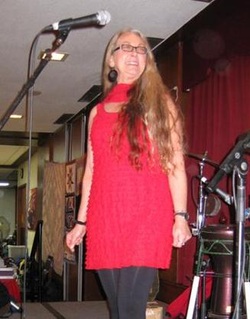
"I think we decided to bring Perpetual e-Motion back because they had been so explosive the previous year on stage, and everyone seemed to have such a great time with them," says Vicki. "It's all about the energy at the dance weekend, and John [Coté] and Ed [Howe] definitely brought it in 2011. Yes, it was a tricky decision, having the same band two years in a row, but we were willing to gamble on the fact that the band was on fire, and dancers just couldn't seem to get enough of them. We didn't know if it had even been done before. My husband and I have been dancing for 15 years, go to A LOT of dance weekends, and we couldn't recall it happening at a weekend we had danced at, so it was perhaps an odd decision, but one that evidently worked."
I was particularly interested in the decision to introduce two electronically-influenced bands to the lineup. Vicki explains, "While Ed and John were here for Chattaboogie in 2011, we talked about bands, music, what they liked, and Double Apex came into the conversation. Ed played some sound clips for us he had on his phone of Double Apex, and it was exciting. It was funky, electric, and we were interested right off the bat. Ed told us they were fairly new, but getting a lot of attention around the Amherst [MA] area, playing events with good crowd exposure, and starting a buzz in the area with their sound. I think, especially with all the energy that was surrounding Perpetual e-Motion at that time, maybe dancers were 'chomping at the bit,' so to speak, for a little more of that kind of sound."
"So, was it intentional, not necessarily. The committee didn't get together and say, 'hey, let's have the first electric dance weekend with TWO electronic bands,' it just happened that way. Ed already knew Julie and told us about Nor'easter, her other band. We listened to some sound clips of Nor'easter, knew then that Julie was talented, so that gave us the idea to bring her along as Double Apex. They are all very proficient musicians, playing great dance music, just in a very different format. Julie is a master on the keyboard, and while Ed was sitting in as the second member of Double Apex, his ability to play the fiddle is nothing short of amazing."
Vicki and Seth Tepfer took turns calling for the techno dance with Julie Vallimont spinning the tunes. I asked Vicki about that experience. "Although I hadn't called a techno dance before, I had attended a few of them. One, the previous year at Cabin Fever and then a few months afterward at the Leaf Festival and Summer soiree. So, I knew a little of what to expect, but you really never know what might happen when you've never actually called in that particular format. I wanted to kind of keep it simple, just to be sure that things didn't go badly."
"I found it more difficult calling the late night techno than calling with Perpetual e-Motion, mostly because of the lack of phrasing. Julie did an excellent job though, of putting music in the loops that could be 'felt' a lot better than the music I've danced to at other techno contras. In fact, she even told me when I got up to the mic that the phrasing would get looser and looser as the night went on. Certainly, I felt like, during the first several dances, the dancers could tell when to change movements, and I could actually drop out of the calling. I'm pretty sure at the other techno contras I attended, I remember the caller having to call throughout the whole entire dance. It was a rush though, I must admit. The music was loud, and the late night dancers were eating it up. They loved it! Plus, when I wasn't calling, Seth was at the mic, and I was dancing. I loved it! It's just a different feeling I think, dancing to electronic music, beat blaring, loud, darkened room.... Just so different."
Where does she see the new infusion of techno contras fitting into the contra tradition?
"Dance traditions evolve and change. That's evident by just dancing some of the old 'chestnuts.' In some of those dances, you don't even swing your partner. Now, with the more modern dances, there is usually a partner swing AND a neighbor swing. If there isn't at least a partner swing, most dancers feel somewhat cheated. Even the unequal dances, where only the active couple swings, or gets most of the action, tend to get a little less play, especially at dance weekends. I do think that techno contras are probably around to stay. The younger crowds seem very excited by them, as well as some of the older dancers. But, I also know dancers that there are a LOT of dancers that would not go out of their way to attend a techno contra. I feel that techno contras are not as community oriented, and just have a different feel...more like a bar or a club. One of the main reasons a lot of people are attracted to traditional contra dancing is feeling that sense of belonging to a community of sorts, instead of feeling like your at a rave, where it might just be about you and a few of your friends. But, traditions evolve, bands change their approach to tunes, and new things are born. Ten years ago, I wouldn't have thought a band like Perpetual e-Motion would be getting so much attention. Dancers become hungry for new things though, and electronic music played alongside live musicians along with techno contras are fairly new. Who knows what new changes will transpire in the music scene ten more years down the road? Will techno replace traditional? No way. But, I believe there is room enough and plenty of dancers to support both."
